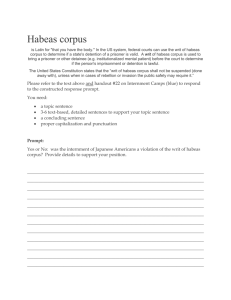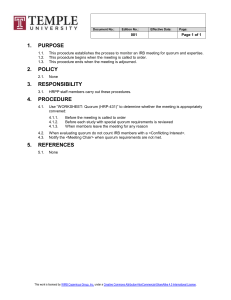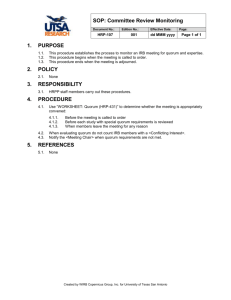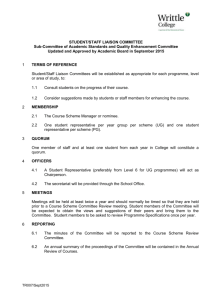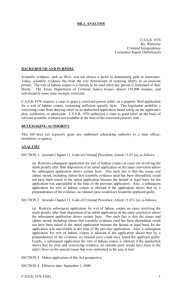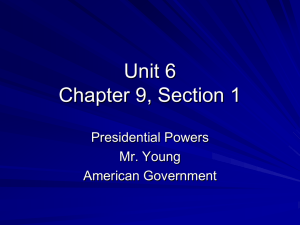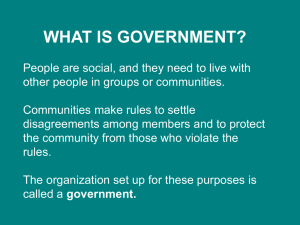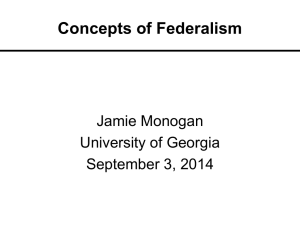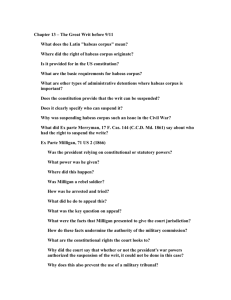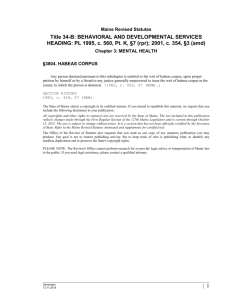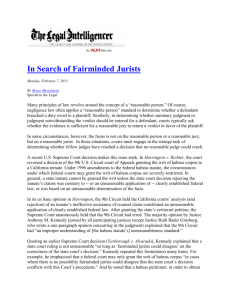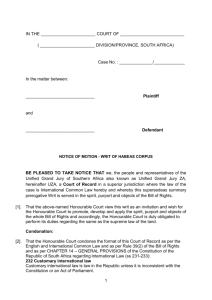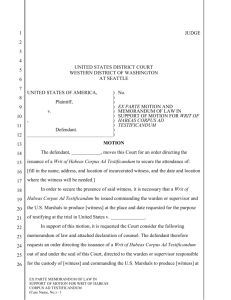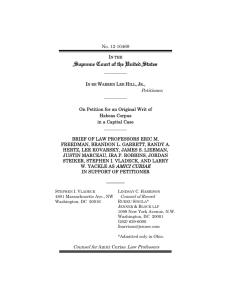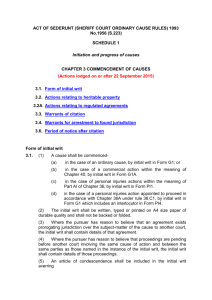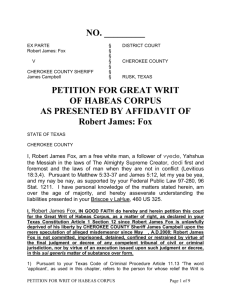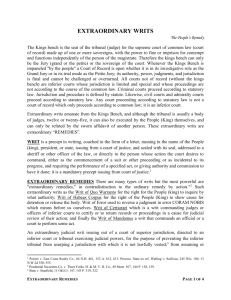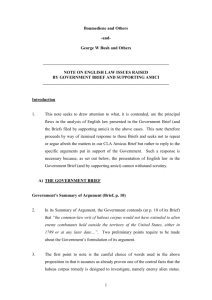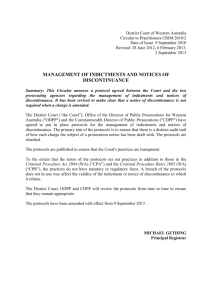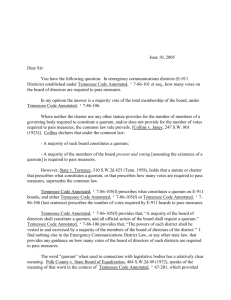Branches of Government Vocabulary
advertisement
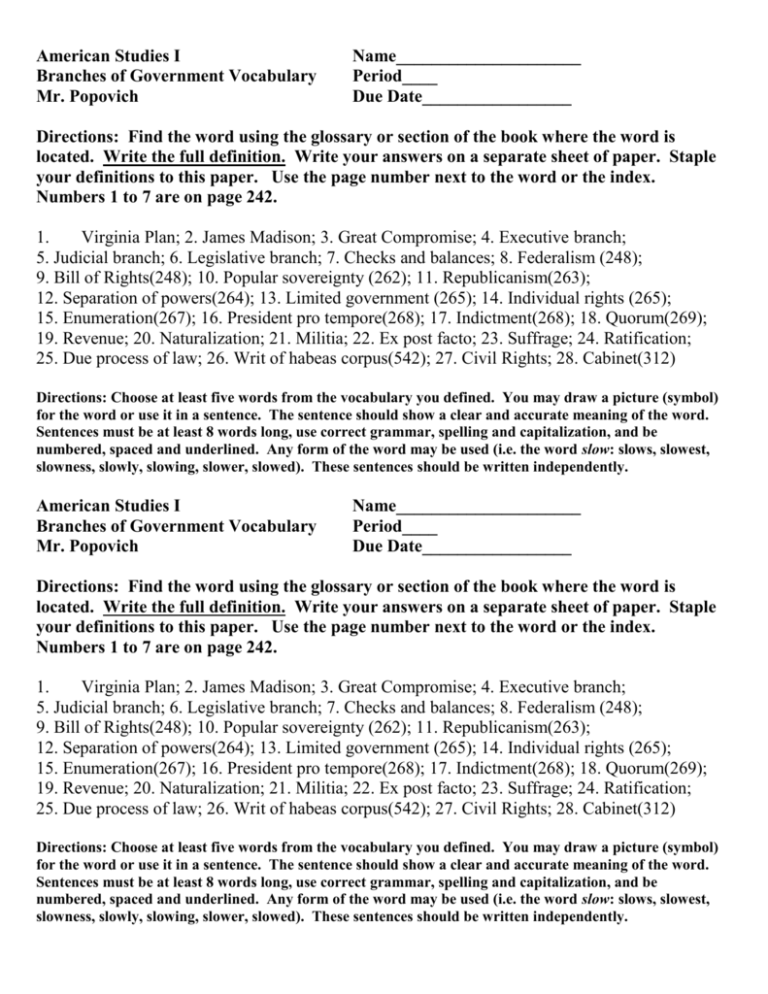
American Studies I Branches of Government Vocabulary Mr. Popovich Name_____________________ Period____ Due Date_________________ Directions: Find the word using the glossary or section of the book where the word is located. Write the full definition. Write your answers on a separate sheet of paper. Staple your definitions to this paper. Use the page number next to the word or the index. Numbers 1 to 7 are on page 242. 1. Virginia Plan; 2. James Madison; 3. Great Compromise; 4. Executive branch; 5. Judicial branch; 6. Legislative branch; 7. Checks and balances; 8. Federalism (248); 9. Bill of Rights(248); 10. Popular sovereignty (262); 11. Republicanism(263); 12. Separation of powers(264); 13. Limited government (265); 14. Individual rights (265); 15. Enumeration(267); 16. President pro tempore(268); 17. Indictment(268); 18. Quorum(269); 19. Revenue; 20. Naturalization; 21. Militia; 22. Ex post facto; 23. Suffrage; 24. Ratification; 25. Due process of law; 26. Writ of habeas corpus(542); 27. Civil Rights; 28. Cabinet(312) Directions: Choose at least five words from the vocabulary you defined. You may draw a picture (symbol) for the word or use it in a sentence. The sentence should show a clear and accurate meaning of the word. Sentences must be at least 8 words long, use correct grammar, spelling and capitalization, and be numbered, spaced and underlined. Any form of the word may be used (i.e. the word slow: slows, slowest, slowness, slowly, slowing, slower, slowed). These sentences should be written independently. American Studies I Branches of Government Vocabulary Mr. Popovich Name_____________________ Period____ Due Date_________________ Directions: Find the word using the glossary or section of the book where the word is located. Write the full definition. Write your answers on a separate sheet of paper. Staple your definitions to this paper. Use the page number next to the word or the index. Numbers 1 to 7 are on page 242. 1. Virginia Plan; 2. James Madison; 3. Great Compromise; 4. Executive branch; 5. Judicial branch; 6. Legislative branch; 7. Checks and balances; 8. Federalism (248); 9. Bill of Rights(248); 10. Popular sovereignty (262); 11. Republicanism(263); 12. Separation of powers(264); 13. Limited government (265); 14. Individual rights (265); 15. Enumeration(267); 16. President pro tempore(268); 17. Indictment(268); 18. Quorum(269); 19. Revenue; 20. Naturalization; 21. Militia; 22. Ex post facto; 23. Suffrage; 24. Ratification; 25. Due process of law; 26. Writ of habeas corpus(542); 27. Civil Rights; 28. Cabinet(312) Directions: Choose at least five words from the vocabulary you defined. You may draw a picture (symbol) for the word or use it in a sentence. The sentence should show a clear and accurate meaning of the word. Sentences must be at least 8 words long, use correct grammar, spelling and capitalization, and be numbered, spaced and underlined. Any form of the word may be used (i.e. the word slow: slows, slowest, slowness, slowly, slowing, slower, slowed). These sentences should be written independently. Vocabulary 1. Virginia Plan: proposal for two-house legislature with representation according to each state’s population or wealth 2. James Madison: prominent advisor to the Constitutional Convention 3. Great Compromise: agreement to establish a two-house national legislature, with all states having equal representation in one 4. Executive Branch: government department that interprets laws 5. Judicial Branch: government department that interprets laws 6. Legislative Branch: government department that makes laws 7. Checks and Balances: the ability of each branch of government to exercise checks, or controls, over the other braches 8. Federalism: system of government in which power is shared between the national (or federal) government and the states 9. Bill of rights: first ten amendments to the U.S. Constitution 10. Popular Sovereignty: a government in which the people rule 11. Republicanism: the people exercise their power by voting for their political represenatives 12. Separation of Powers: the division of basic government roles into branches 13. Limited Government: in the American government everyone, citizens and powerful leaders alike, must obey the law 14. Individual Rights: personal liberties and privileges 15. Enumeration: an official count, such as a census 16. President Pro Tempore: for the time being 17. Indictment: formal charge or accusation 18. Quorum: the minimum number of members that must be present for official business to take place 19. Revenue: income a government collects to cover expenses 20. Naturalism: a way to give full citizenship to a person of foreign birth 21. Militia: an emergency military force, such as the National Guard, that is not part of the regular army 22. Ex Post Facto (Law): a law that would make an act a criminal offense after it was committed 23. Suffrage: right to vote 24. Ratification: official approval 25. Due Process of Law: fair treatment under the law 26. Writ of Habeas Corpus: law that prevents the government from holding citizens without formal charges 27. Civil Rights: rights granted to all citizens 28. Cabinet: group of executive department heads that serve as the president’s chief advisers
